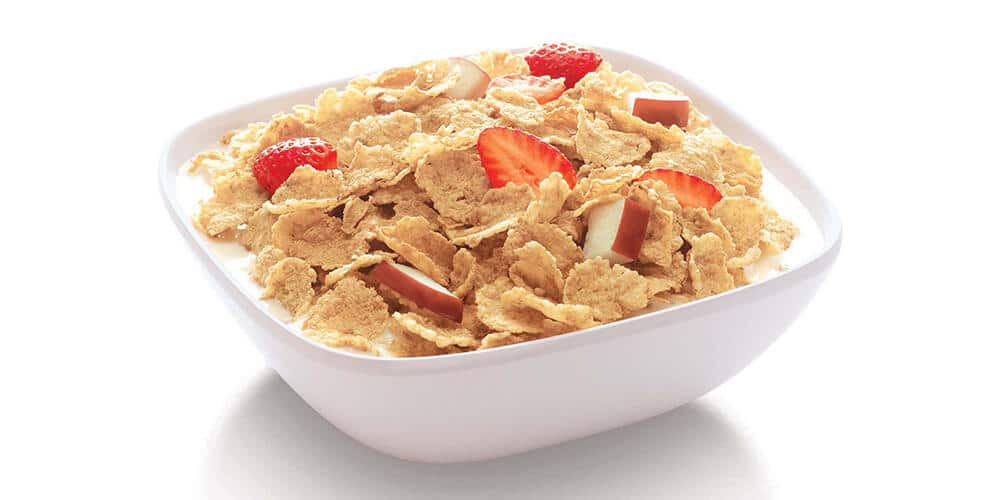
What is a Balanced Breakfast?
USDA recommends that a “balanced breakfast” should be one that is nutrient dense (that is high in nutrients and low in calories).
1. Breakfast can improve nutrient intakes
2. Breakfast-eaters tend to have healthier body weights
3. Breakfast carries many other benefits.5, 6, 7, 8, 9
4. Breakfast consumption promotes physical and mental well-being
Hence, taking as little as five minutes to relax and prepare for the day with a bowl of cereal, milk and fruit really ensures a positive start.
1 Williams P.G. (2014) The Benefits of Breakfast Cereal Consumption: A Systematic Review of the Evidence Base. Adv Nutr. Sep;5(5): 636S-673S.
2 Barr S.I. etal (2014) Breakfast consumption is positively associated with nutrient adequacy in Canadian children and adolescents. Br J Nutr. 2014 Oct28;112(8): 1373-1383.
3 Moore F.F. etal (2016) Impact of Breakfast Skipping and Breakfast Choice on the Nutrient Intake and Body Mass Index of Australian Children. Nutrients. Aug;8 (8):487.
4 O’Neal C.E. etal (2014) Nutrient intake, diet quality, and weight/adiposity parameters in breakfast patterns compared with no breakfast in adults: National Health and Nutrition Examination Survey 2001-2008. J Acad Nutr Diet. Dec;114(12 Suppl):S27-43
5 Odegaard etal A.O. (2013) Breakfast Frequency and Development of Metabolic Risk. Diabetes Care. Oct; 36(10):3100-3106.
6 Uemura M. etal (2015) Breakfast Skipping is Positively Associated with Incidence of Type 2 Diabetes Mellitus: Evidence from the Aichi Workers’ Cohort Study. J Epidemiol. 25(5):351-358.
7 Shafiee G.et al (2013) Association of breakfast intake with cardiometabolic risk factors. Jornal de Pediatria, Volume 89, Issue 6, November-December Pages 575-582
8 Kubota Y.etal (2016) Association of Breakfast Intake with Incident Stroke and Coronary Heart Disease- The Japan Public Health Center-Based Study. Stroke, 47:477-481.
9 Maki K. C. etal (2016) The Effects of Breakfast Consumption and Composition on Metabolic Wellness with a Focus on Carbohydrate Metabolism. Adv Nutr. May; 7(3):613S-621S
10 Tee E.S. etal (2018) Breakfast consumption among Malaysian primary and secondary school children and relationship with body weight status – Findings from the MyBreakfastStudy. Asia Pac K Clin Nutr. 27(2):421-432.
11 Blondin SA (2016) Breakfast consumption and adiposity among children and adolescents: an updated review of the literature. Pediatr Obes. Oct;11(5):333-48.
12 Sakurai M (2017) Skipping breakfast and 5-year changes in body mass index and waist circumference in Japanese men and women. Obes Sci Pract. Jun;3(2):162-170.
13 Deshmukh-Tasker: et al. The relationship of breakfast skipping and type of breakfast consumed with overweight/obesity, abdominal obesity, other cardiometabolic risk factors and the metabolic syndrome in young adults. The national Health and Nutrition Examination Survey (NHANES): 1999-2006. Public Health Nutr. 2013;16(11):2073-82.
14 Hallstrom, L et al. Breakfast consumption and CVD risk factors in European adolescents: The HELENA (Healthy Lifestyle in Europe by Nutrition in Adolescence) Study. Public Health Nutrition, ISSN1368-9800, E-ISSN 1475-2727, Vol. 16, no7, p.1296-1305.
15 Williams PG. The Benefits of Breakfast Cereal Consumption: A Systematic Review of the Evidence Base. Adv. Nutri. 2014;5:6365-6735.
16 Wang M. etal (2016) Breakfast Consumption and Its Associations with Health-Related Behaviors among School-Aged Adolescents: A Cross-Sectional Study in Zhejiang Province, China. Int J Environ Res Public Health. Aug;13(8):761.
17 Larson N, et al. Eating breakfast and dinner together as a family: associations with sociodemographic and implications for diet quality and weight status. J Acad Nutr Diet. 2013;113(12):1601-9.
Keeping you up-to-date on all things health and nutrition

USDA recommends that a “balanced breakfast” should be one that is nutrient dense (that is high in nutrients and low in calories).

Incorporation of breakfast cereals as part of a balanced breakfast provides a great opportunity to include important benefits of grains in the diet.
Mars Completes Acquisition of Kellanova. Read More